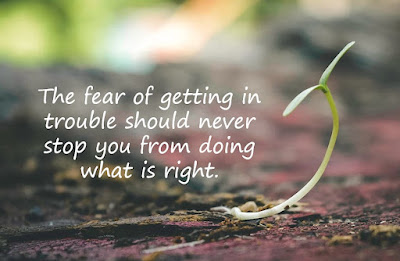Received in WhatsApp
I heard this story
once about a teacher who let a fish out of its bowl & left a classroom of
children as it flopped around. Telling them that if anyone left their seat,
they would be expelled.
All of the children
sat and watched as this fish flopped gasping for air, not wanting to get up in
order to avoid getting in trouble.
Finally, a girl
sprang up from her seat & ran to the fish, placing it back in the bowl.
Ultimately, she was
the only one who refused to watch the fish die.
When the teacher returned,
he told the class that this was a lesson.
That the fear of
getting in trouble should never stop you from doing what is right. That sometimes
you may have to oppose authority & group think, simply because it's the
right thing to do.
It is not just enough to know what is the right thing to do, one must also have the courage to do it. It isn't always easy, many a times its real hard, but thats the way it is. Doing the right thing is always right.




















